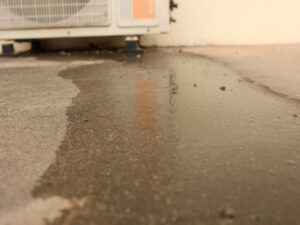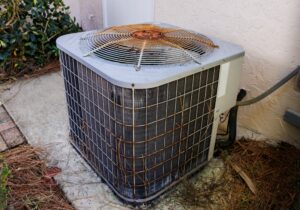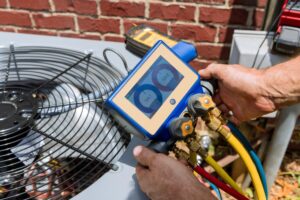Is water dripping from your home’s air conditioner, or is there a puddle forming at the base of the unit? If so, know that this is a common issue many homeowners face, especially during the hot summer months when the system is working overtime.
It may surprise you, but air conditioning systems don’t just circulate air — they also manage condensation. As warm air passes over the evaporator coil, the coil cools the air and causes water vapor to condense into liquid droplets. These droplets are then collected in a drain pan and directed outside via a condensate drain line. When any part of this process malfunctions, water can leak into places it shouldn’t.
Let’s take a closer look at the most common reasons your AC may be leaking.
Clogged Condensate Drain Line
The most likely reason your air conditioner is leaking water is because the condensate drain line is clogged. Over time, this narrow pipe can become obstructed by algae, mold, or debris. As a result, the water backs up into the drain pan and eventually spills over into your home.
Regular maintenance can prevent this issue entirely, saving you from unexpected indoor puddles and potential water damage. If you need help clearing a clogged drain line, call the HVAC technicians at H.J. Faust. No problem is too small when it comes to restoring your home’s comfort.
Dirty or Clogged Air Filter
When was the last time you changed your air filter? This simple maintenance task can prevent a surprising number of AC problems, including water leaks.
When the filter becomes too clogged with dust and debris, it restricts airflow over the evaporator coil. This reduced airflow can cause the coil to become excessively cold and eventually freeze. Once the ice melts, the water might overflow the drain pan, especially if the drainage system can’t keep up. Replacing your air filter every 1-3 months can help you avoid this situation.
Blocked Vents or Registers
Have you rearranged your furniture recently? Blocking vents — or closing too many registers — can throw off the air pressure in your HVAC system. This can reduce airflow and eventually cause the evaporator coil to freeze. As with other causes of frozen coils, once the ice melts, water can overflow and leak from your unit. It’s always a good idea to keep vents open and unobstructed for proper airflow and to prevent your air conditioning from leaking water everywhere.
Frozen Evaporator Coil
Your evaporator coil works hard to pull heat and humidity from your home’s air. So, what happens when it gets too dirty? The coil can’t efficiently transfer heat, causing the temperature to drop too low and eventually freeze.
Once the ice thaws from the coil, the volume of water often exceeds what your drain pan can handle, resulting in overflow and leaks. If you spot ice on your unit or puddles around its base, it’s best to turn off the system and call a technician right away. Additionally, prioritizing filter changes and annual professional cleanings can keep the evaporator coil functioning properly and ice-free.
Rusted or Damaged Drain Pan
Let’s say your AC is relatively old. If that’s the case, you might be dealing with a rusted or damaged drain pan. This metal or plastic tray is responsible for catching the condensation from the evaporator coil and guiding it to the drain line.
Over time, metal pans can rust through, and plastic ones may crack. Either issue will allow water to escape before it has a chance to drain properly. The good news is that an experienced HVAC technician can quickly replace this pan and get your system cooling your home again in no time.
Broken or Disconnected Condensate Pump
Some air conditioning systems, particularly in basements or attics, rely on a condensate pump to move water to an external drainage area. If this pump fails or becomes unplugged, water has nowhere to go and can collect around your unit.
How do you know if a malfunctioning condensate pump is to blame? Unfortunately, it can be hard to tell without the proper training. In fact, you might not realize the pump is broken until you see water pooling where it shouldn’t be. In some cases, you may hear a buzzing sound or an alarm indicating something’s not working as it should. If you notice any of these telltale signs of trouble, call for an AC repair right away.
Improper Installation
Did you just have your AC system installed or moved? If so, improper installation may be to blame for your air conditioner leaking water. If the unit isn’t level, condensation might not flow properly into the drain pan or through the drain line. This might sound like a small mistake, but even slight tilting can result in significant water issues over time. That’s why it’s critical to have your AC installation completed by certified professionals who double-check for proper leveling and slope.
Low Refrigerant Levels
Surprisingly, those water puddles might actually be telling you about a refrigerant issue. When refrigerant levels drop due to a leak, your evaporator coil gets much colder than it should. This can result in an icy buildup that eventually melts and overwhelms the unit’s drainage system.
If your system is simultaneously leaking water and struggling to cool your home, low refrigerant could be the underlying issue. It’s a good idea to have a technician inspect your system and recharge the refrigerant as needed.
What to Do if Your AC Is Leaking Water
First things first: turn off your air conditioner to prevent further damage. Then, inspect the area to see if you can identify the source. Check for blocked vents, closed registers, and dirty air filters. If you’ve corrected all of these issues, and your AC unit is still leaking water, call an HVAC technician and schedule an appointment as soon as possible. Many causes of AC water leaks require professional attention. Your local technician will also have the tools and expertise to diagnose and repair the root of the problem safely and effectively.
Trust H.J. Faust to Handle Your AC Leaks With Confidence
When your air conditioner is leaking water, turn to the certified HVAC technicians at H.J. Faust, Inc. We have years of experience troubleshooting AC problems, and leaks are no match for our experts. We will thoroughly inspect your air conditioner to pinpoint the exact problem and provide long-lasting solutions that keep your home comfortable and dry.
For detailed diagnostics and expert repairs, contact us today to schedule a service. Whether you need a fix for your central air conditioner or a ductless mini-split repair, we have you covered.



